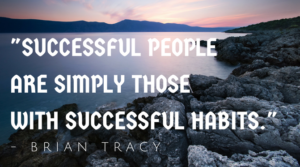 A big part of our lives consists of habits. Whether it is a morning routine or a bedtime routine, these habits can help you or hinder you. For example, if you play games on your phone before bed, it may take longer to fall asleep because you either play games longer than you planned or because you can’t shut your brain down … or both. On the other hand, if you set a consistent time to wake up in the morning, then work out and have a healthy breakfast, you are starting your day on a positive note. That’s good! Think about some of your daily habits. Are they positive and healthy? Will they lead you toward your goals? Or are they unhealthy and destructive and lead you away from where you want to be in life?
A big part of our lives consists of habits. Whether it is a morning routine or a bedtime routine, these habits can help you or hinder you. For example, if you play games on your phone before bed, it may take longer to fall asleep because you either play games longer than you planned or because you can’t shut your brain down … or both. On the other hand, if you set a consistent time to wake up in the morning, then work out and have a healthy breakfast, you are starting your day on a positive note. That’s good! Think about some of your daily habits. Are they positive and healthy? Will they lead you toward your goals? Or are they unhealthy and destructive and lead you away from where you want to be in life?
If you research successful people, you will see that they have habits that help them accomplish their goals. They do things every day that make a positive impact on their future. Over the years, I have read a LOT articles, blogs and books that focus on what successful people do every day. For fun, I decided to keep track of what many of them were saying and here is what I found:
Plan Your Day
Successful people not only write down their goals and focus on them daily but they also map out what they are going to do the next day before they go to bed. Of course, life doesn’t always happen according to plan but, when you start with a plan, it is easier to adjust your day as needed without losing momentum. Many articles also mention that when you map out your day the night before, your brain focuses on that plan while you sleep which helps you stay focused on your goals and get more done during the day.
It also helps if you prioritize your action items for the day so that you are doing the things that will give you the biggest bang for your buck in the morning when you have the most energy. Select 2-3 things that you have to get done for the day and focus on those things first… and don’t stop until they are done.
Meditation
I noticed in my research that many successful people meditate on a daily basis. There are a few different ways that you can meditate. You can use the time to clear your brain by focusing on your breathing. Some people use the time to visualize their goals or focus on positive incantations, which can improve mood and clarity. What I have found works for me is to have a quote that really inspires me and repeat that several times during my meditation. The quote might be about business, physical or relationship goals… Whatever I feel like focusing on that day. I find a quiet spot and I repeat it to myself for the first 5-7 minutes and then I transition to focusing on my breathing for the last 5-8 minutes. It can take several months for your brain to stop wondering off and thinking about other things, but that’s ok. I have found that having quiet time for even 15 minutes a day (sometimes twice a day) to reflect on career, health and relationships has helped reduce stress. After meditating for even 10 minutes, I feel more centered and calm which helps me focus on the task at hand.
Workout
Another success habit that was mentioned a lot is making health a priority. Some included both a daily workout as well as a nutritious diet, although most focus on the workout. Research shows that working out can boost creativity and productivity. Everyone knows the benefits of a good workout and a healthy diet so I won’t go into too much detail on this one. I am sure that you have heard time and time again… nutrition and exercise have a positive affect on every area of your life, from your mood, to your energy levels, to sleep and digestion and everything in between.
I have found that a morning workout energizes me for the rest of the day. My advice is to pick an exercise that you enjoy. It can be as simple as a morning walk or a bike ride or weight training. You can choose yoga, swimming, skiing, jogging or a combination of two or more of these. Exercise will also help you sleep better at night, which leads me to the next success habit…
Get Enough Sleep
Getting enough sleep is critical to your mental health and memory function. If you are not a morning person, you are my people. I am a night owl, NOT a morning person. I have found that, when planning the next day’s activities, if I give myself something to look forward to, it is much easier to get out of bed before the sun comes up. I have also learned that hitting snooze only gives me time to think about how tired I am and reasons why I should not get up… so, if you struggle with this as well, put the alarm clock on the other side of the room so you are forced to get out of bed and then do not let yourself get back in bed once you turn it off!
Make sure you have a good bedtime routine so that your body and your brain are ready to go to bed at least eight hours before the alarm goes off. Do not turn on the TV or spend time on your phone or tablet once you are in bed. You can even test how much sleep your body needs…go to bed at the same time every night and let yourself sleep until you wake up. Your body may need to catch up on sleep so you may find that you sleep later the first few days. Once your body catches up on the sleep it needs, you will wake up when your body is rested. This helps you get a better idea of how much sleep that you need every night. So, for example, if you go to sleep at 10pm every night and you naturally wake up at 8, 9 or 10am for a few days and then start waking up at 5am without an alarm, that means that your body needs about seven hours of sleep every night to be fully refreshed.
Self Development
Successful people are always focused on continuous learning. There is always room for personal growth. Whether it is learning new skills, reading, watching podcasts, or interviews, there is a plethora of information out there. I read somewhere that Mark Cuban reads three hours a day. Bill Gates, who’s net worth is $86 billion, reads an hour a day and Elon Musk used to read four hours a day when he was younger!
Learning is a continuous, life long effort. You can also learn from biographies, history and self-help books. Pick a topic that you are interested in and you will be more likely to follow through with this. I love that my Kindle filters what I highlighted so I can easily see what I felt was important or resonated with me. I even highlight different items in different colors. So, for example, if it is something that really speaks to me, I will highlight it in yellow. If it is something that I can use during my coaching sessions, I highlight it in blue. Quotes I like are highlighted in pink, and so on. Use what makes sense to you and helps you keep track of your ah-ha’s.
Success comes down to the decisions that you make every day. Successful people do things EVERY DAY that get them closer to accomplishing their goals. They do things that make a positive impact on their future every day. Not just when they feel like it. Every. Day.
How do you implement success habits? Here are a few steps that will help you get started:
- Write a list of all the things that you eventually want to implement as success habits. An example of positive morning habits would include getting up 60-90 minutes early to work out and eat a healthy breakfast. If you already do that, you could choose to add 10-20 minutes of meditation or read for 30 minutes. At night, you might choose to read before bed, stretch, or write 5-10 things you are grateful for in your journal.
- Choose 1-2 habits from your list as a starting point. So, for example, I wasn’t being consistent with my exercise program so I decided to get up 60 minutes earlier every morning and workout. I ride my bike for 30 minutes every morning and include about 20 minutes of weight lifting 3-4 times a week.
- Do this success habit every day for at least 30 days. Tip: I have found that it helps to have a calendar and cross off the days that I complete all my success habits. I like seeing all the bright X’s… and the more X’s I see, the more motivated I am not to break the chain!
- After 30 days, add another success habit … like eating a healthy breakfast
- After 30 days, add another success habit … like reading for 30 minutes every night
- After 30 days, add another success habit … like eating a healthy dinner
These habits may be uncomfortable at first. It may not feel natural and you may need to set an alarm to remind yourself to read before bed, for example. For me, getting up 60 minutes early is the one that I picked to tackle first because I am not a morning person.
Think about the power of adding on at least one new success habit on the first of every month. Can you imagine what life could be like after a year of adding even ONE success habit a month? You could have 12 new positive habits after a year. If they are health/nutrition habits, you could finally have a healthy body and amazing energy. If they are financial habits, you could be debt free or traveling to places you have never been.
If you have already put success habits into play in your life, feel free to comment below and share what they are and how they have positively affected your life!
 There are several reasons why people don’t reach their goals. What keeps them stuck in the same place, day after day?
There are several reasons why people don’t reach their goals. What keeps them stuck in the same place, day after day? We have been asked about our life goals since we were small children. We have been surrounded by questions like what do you want to be when you grow up, do you want to have children, where is your dream home, what type of person do you want to marry, etc.
We have been asked about our life goals since we were small children. We have been surrounded by questions like what do you want to be when you grow up, do you want to have children, where is your dream home, what type of person do you want to marry, etc.